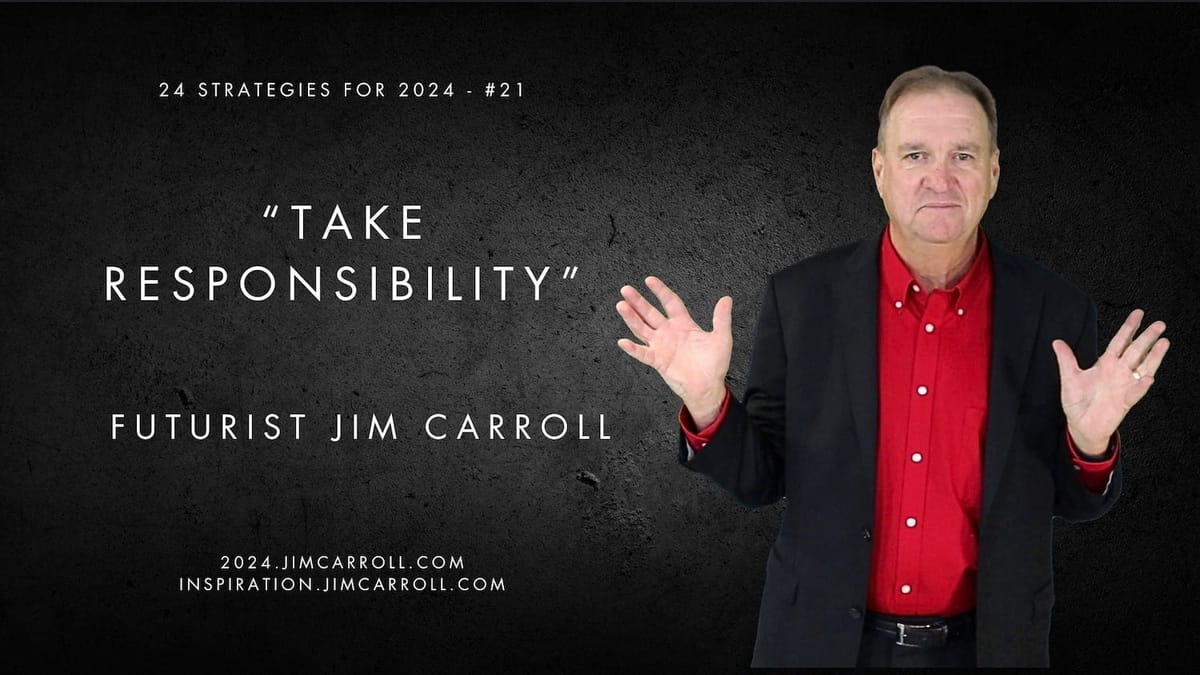Futurist Jim Carroll is running a series that began November 27, 2023, and will end on January 1, 2024 - '24 Strategies for 2024.' Rather than running a trend series for the upcoming year as he has previously, this series will examine a number of his personal beliefs on how to best align yourself with the future. There will be a post each weekday, excluding weekends and holidays, until the series runs its course. You will find it on his blog at https://blog.jimcarroll.com or https://2024.jimcarroll.com
Stop making excuses - start manufacturing solutions!
I've been emphasizing for years that 'the future belongs to those who are fast' - in fact, it's the title of one of my books. And yet many people fail to gain enough escape velocity to get beyond the challenges of today into the opportunities of tomorrow; they become stuck in a trap of their own making. Why does this happen? Because they spend more time making up excuses for their inaction and not enough initiative for their actions.
They never take responsibility for the fact that they are the only ones who can accomplish the 'moving' part of 'moving forward.'
What happens when we fail to take responsibility? We tend to blame everyone but ourselves for our inaction and lack of initiative - because it's the easy way out! When we do that, we fail to do what we need to do to move forward. That reality does not serve us well into the next year. 2024 will be full of both massive new opportunities and the potential for small wins - new skills to learn, challenges to pursue, technologies to explore, applications to be implemented, ideas to be chased and innovation concepts to be explored. As I always say, it's what you do with this fact that matters!
Many people won't take advantage of this fact, because they live in a world in which the 'innovation killers' are rampant - it's a form of organizational sclerosis that clogs up the ability to chase new ideas and a blockage of the personal artery of initiative that clots up any pathway that might lead for a chance for breakthrough performance. The innovation killers? From Las Vegas, 2009:
Do you do this? Think about some of the most common excuses that you might make today - or that you might hear your peers state regularly: "I'm just too busy right now. Maybe later when I have more time…" "I don't have the money." "I don't have the time." "I've never done this before." "I don't have the skills." "The conditions aren't right." "I'm too busy." "It won't work." "I'm not good enough," "I'm going to look dumb." "This doesn't work in my situation."
Over the years, I have spent so much time watching the innovation killers at work in so many organizations that I have woven it throughout my stage material and into my website - I've got an entire page devoted to the topic. It's over at - of course - https://innovationkillers.jimcarroll.com. When I present it on stage, I can see a lot of heads nodding in agreement - people know that it is a common problem.
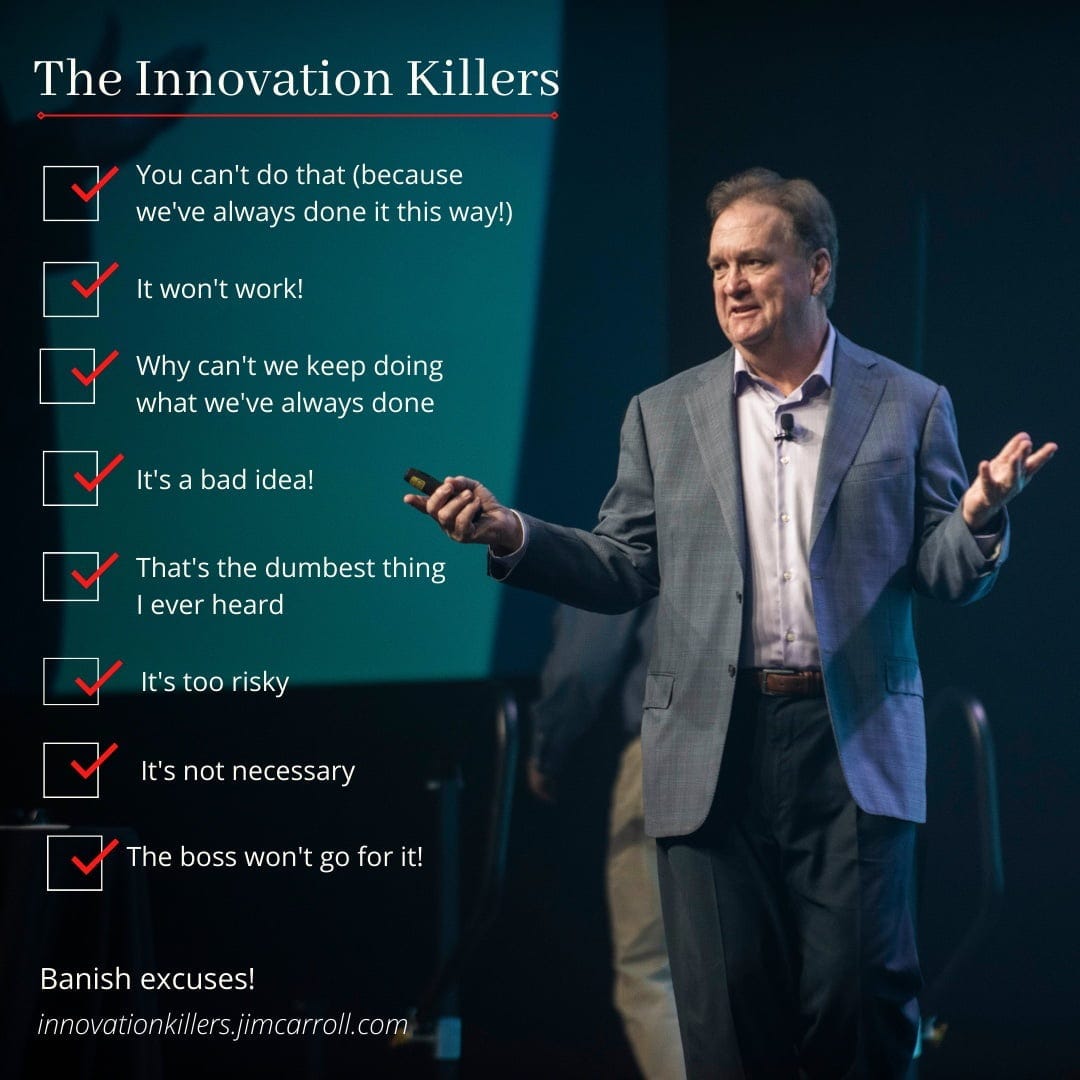
There are so many common excuses that are made by organizations and their leaders that we can often see the death of innovation happening in real-time - and we know that it will lead to a failure to adapt to change, disruption, innovation, and transformation with markets and industries. The result is that organizations often fail or die because their excuses permit them to do so - they never take responsibility.
Why does it happen? it comes about by downplaying disruptive threats - we can delude ourselves into minimizing the impact of significant trends, trying to avoid the new reality they present until it is far too late, Once we do this, we lose all ability to deal with these challenges effectively, and avoid any opportunity to turn those threats into an opportunity. In other cases, we spend too much time chasing perfect data - we get ourselves into the mindset that we need absolutely convincing data to move forward, but might never actually see such information. The result is that we hide our opportunity to take a risk behind the veneer of a lack of courage amplified as an excuse for information. Parse that phrase. I'll wait.
And then, by the time we have the data we need, the window of opportunity has shrunk, if not disappeared - we get the timing wrong. In many other situations, we underestimate the need for radical change: we believe that the status quo will suffice. Or, we fall into the trap of thinking that the skills we have, the mindset we possess, the action plans we have in place, and the strategies we have defined will be sufficient - until we realize that they won't be. We might often wait until evidence of the need for change is abundantly clear, by which time the opportunity for action has been missed.
I will often point out these reasons by identifying the corporate culture that permits inaction to become the only course of action - what I call the 'enemies of innovation.'
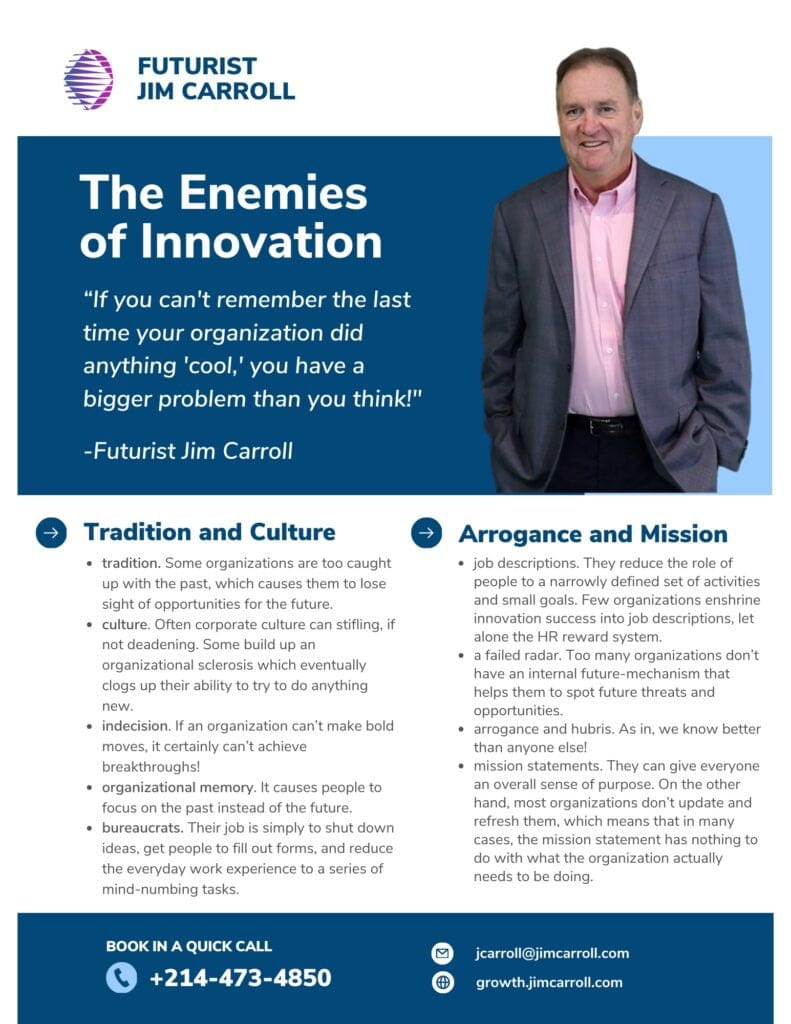
What happens is that these enemies get in our way, and become a barrier to action. They are the bedrock for the foundation of excuses that bolt us to the realities of today instead of the opportunities of tomorrow. These include:
- tradition. Some organizations are too caught up with the past, which causes them to lose sight of opportunities for the future.
- culture. Often corporate culture can be stifling, if not deadening.
- organizational memory. It causes people to focus on the past instead of the future.
- bureaucrats. Their job is simply to shut down ideas, get people to fill out forms, and reduce the everyday work experience to a series of mind-numbing tasks.
- job descriptions. They reduce the role of people to a narrowly defined set of activities and small goals. Few organizations enshrine innovation success into job descriptions, let alone the HR reward system.
- a failed radar. Too many organizations don’t have an internal future mechanism that helps them to spot future threats and opportunities.
- arrogance and hubris. As in, we know better than anyone else!
- mission statements. They can give everyone an overall sense of purpose. On the other hand, most organizations don’t update and refresh them, which means that in many cases, the mission statement has nothing to do with what the organization needs to be doing.
I could go on - the inventory of the inaction that leads to excuses is too long to prepare an exhaustive list. Whatever the case might be, we don't take enough responsibility to do what we need to do to successfully transition into tomorrow. That's why this is strategy #21 of my 24 Strategies for 2024 series - take responsibility. Stop it with the excuses already!
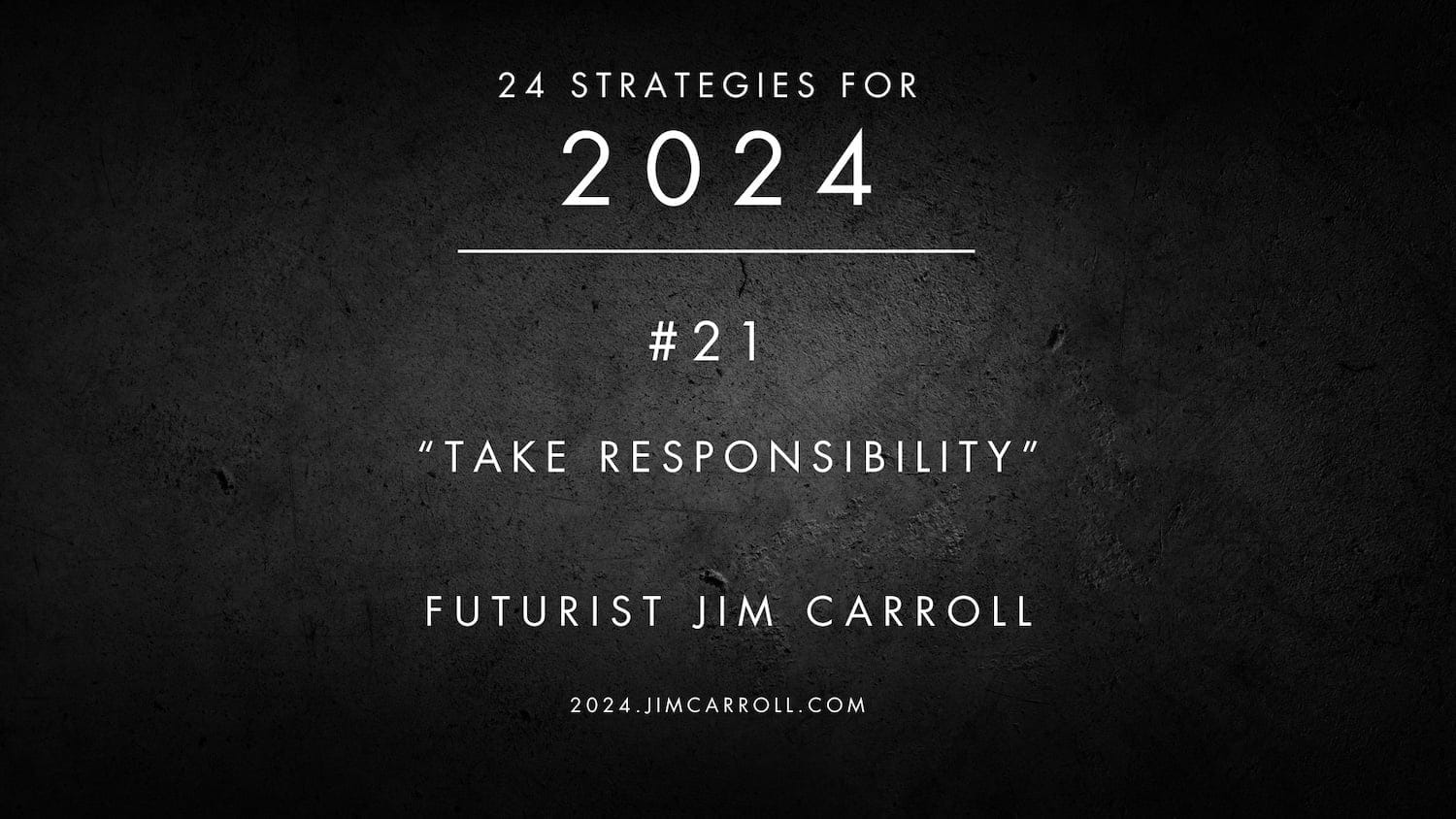
Take responsibility. Stop making excuses - start manufacturing solutions!
How do you do this?
First and foremost - acknowledge the problem. At this very moment, think back to what you did during 2023. Where did you let an excuse hold you back from moving forward? At one moment did you let inaction determine your destiny, indecision hinder your initiative, or a lack of clarity postpone your opportunity?
Second, acknowledge these moments as a failure - your ability to confront your past mistakes and previous inaction instead of denying their impact is the only way to move forward.
Third, commit to a plan of corrective action - 2024 will be your year of being decisive! You are going to do the things you have postponed, learn that skill you have always thought about, chase the big bold idea that has been in the back of your mind, and undertake the reinvention of your life that you have long been thinking about. That's because committing to action is a critical part of taking responsibility.
Fourth, commmit to undertaking a regular inventory of where you might be slipping into old bad habits. Watch for those moments when you are letting a lack of responsibility destroy your chance to chase opportunity. Over on my innovation iller page, I will often suggest that people and organizations go through the list of excuses, and score a point for each one that they tend to use.
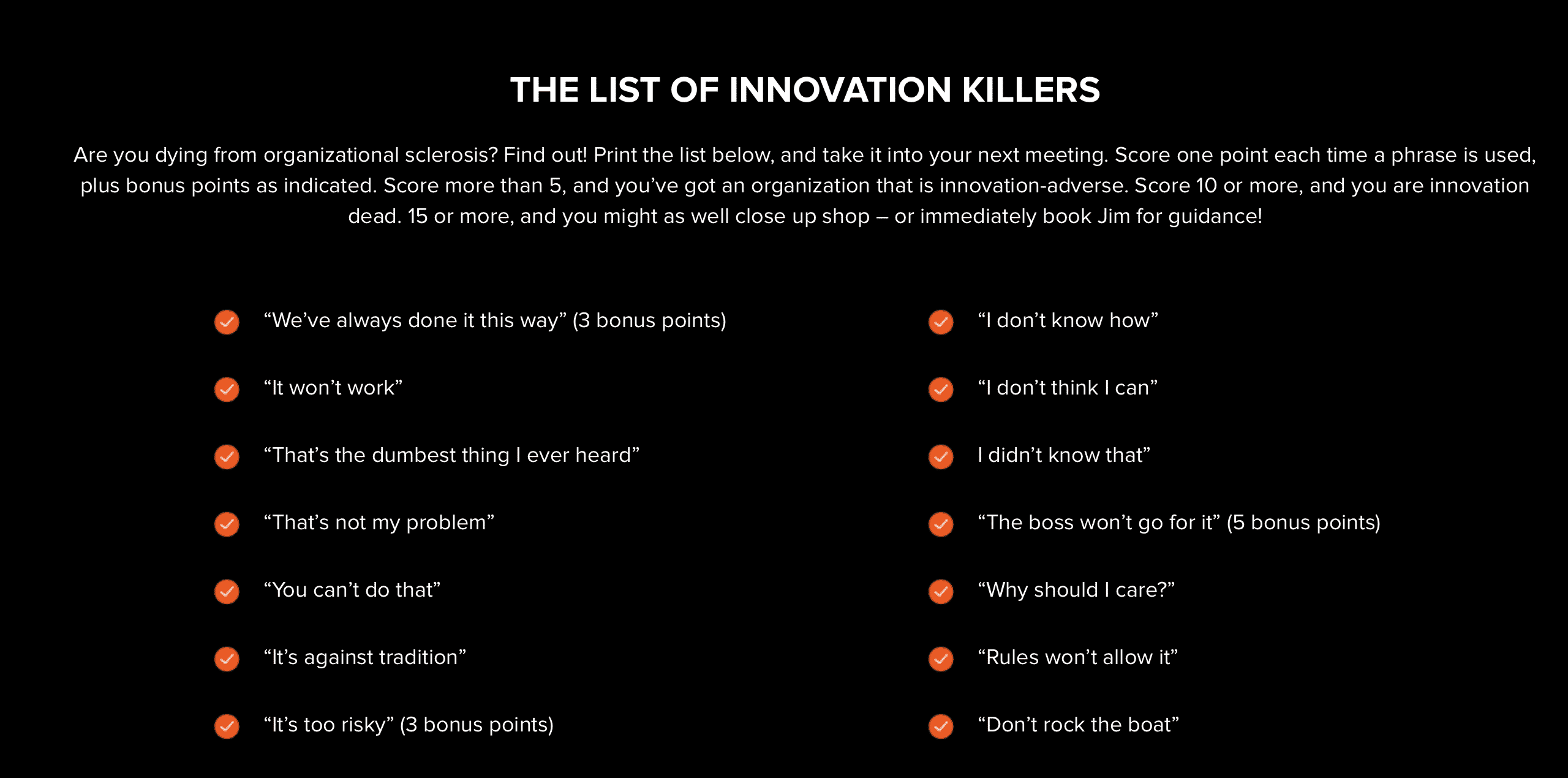
Through the year, score your attitude regularly, and if you see yourself slipping - take action!
Take responsibility!
Futurist Jim Carroll used to make a lot of excuses until he realized that they were essentially really unhelpful.

